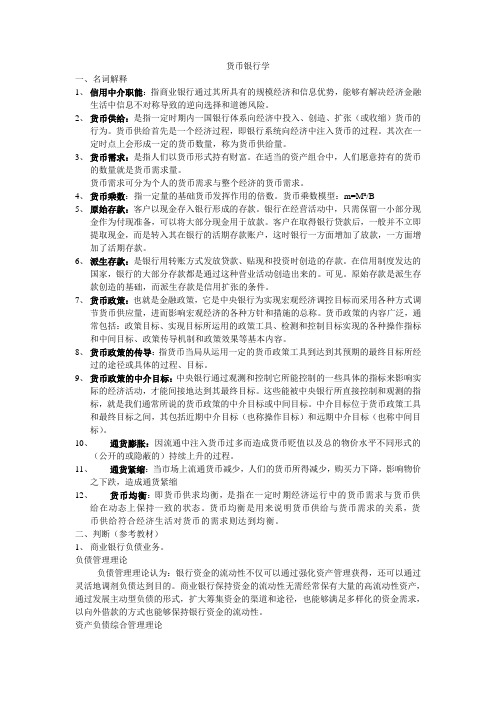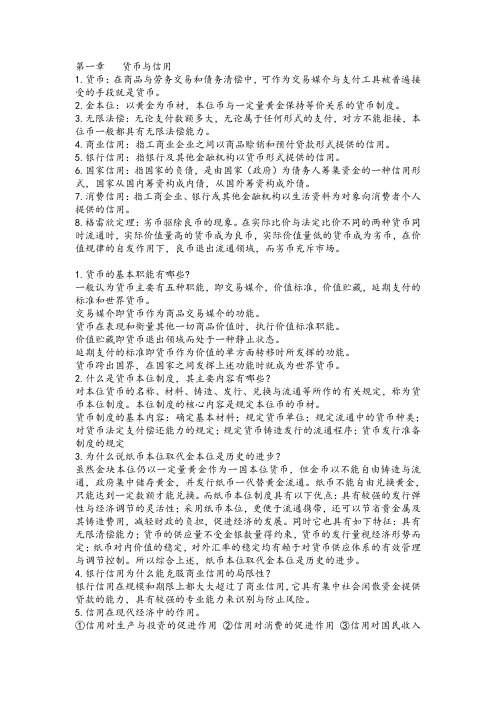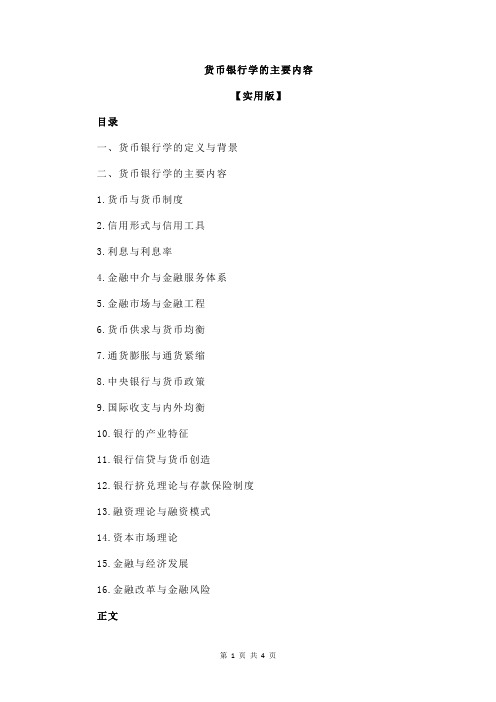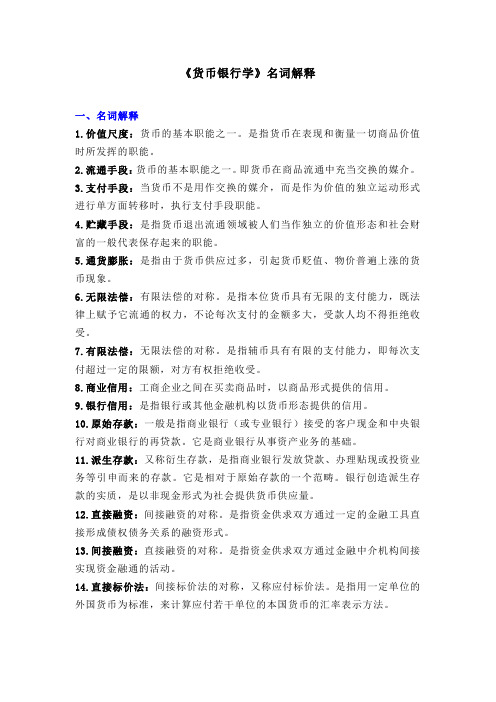货币银行学
《货币银行学》教学教案(全)

单利和复利是两种主要的利息计算方式,它们在计算方法和结果上存 在差异,投资者需要根据实际情况进行选择。
PART 04
金融机构体系
REPORTING
金融机构概述
金融机构的定义
金融机构是指从事金融服务业有关的金融中介机构,为金融体 系的一部分,金融服务业(银行、证券、保险、信托、基金等 行业)与此相应。
国际金融监管协调
随着金融全球化的加速发展,国际金融监管协调变得越来 越重要。各国政府和监管机构需要加强合作和协调,共同 应对跨国金融风险和挑战。
国际金融监管标准
国际组织和各国政府制定了一系列国际金融监管标准,如 巴塞尔协议等,以促进国际金融市场的稳定和健康发展。
THANKS
感谢观看
REPORTING
信用在现代经济中的作用 现代经济中,信用已成为经济活动的重要组成部 分,对于促进经济发展、维护经济秩序具有重要 作用。
信用形式与信用工具
信用形式
01
商业信用、银行信用、国家信用、消费信用等是主要的信用形
式,每种形式都有其特定的运作方式和特点。
信用工具
02
汇票、本票、支票等是常见的信用工具,它们作为信用的载体,
货币的起源
简单商品交换中产生,作 为价值尺度和流通手段的 属货币, 再到信用货币,最后到电 子货币的发展历程。
货币形式的演变
随着商品经济的发展和科 技的进步,货币形式不断 演变,从贝壳、布帛、金 属到纸币、电子货币等。
货币的本质与职能
货币的本质
货币的作用
一般等价物,是固定充当一般等价物 的特殊商品。
的货币价值总和。
02
国际收支平衡表
记录一个国家在一定时期内各项对外经济往来的统计报表,包括经常账
货币银行学

政策性银行
为特定政策目标而设立,提供 政策性贷款和金融服务,如国 家开发银行、中国农业发展银 行等。
银行的业务与创新
传统业务
创新业务
电子银行业务
跨境金融服务
吸收存款、发放贷款、 汇兑结算等。
理财产品、资产证券化、 金融衍生品等。
网上银行、手机银行等。
国际结算、外汇交易等。
银行的监管与风险管理
01
影子银行的风险
影子银行在提供灵活融资服务 的同时,也带来了流动性风险 、信用风险和市场风险等多种 风险。
影子银行的监管
各国政府和监管机构正在加强 对影子银行的监管,通过提高 透明度、限制杠杆率和规范业 务模式等措施,降低影子银行 的风险。
国际金融合作与竞争
国际金融合作的必要性
随着全球经济一体化的深入发展,国际金融合作对于维护 金融稳定、促进经济发展和应对全球性挑战具有重要意义。
金融稳定理事会(FSB) 负责监测全球金融体系的风险,推动各国加强金 融监管合作与协调,维护全球金融稳定。
3
国际货币基金组织(IMF) 提供资金支持应对金融危机,推动各国加强政策 协调与合作,维护全球经济和金融稳定。
06
货币银行学前沿问题
数字货币的发展与影响
数字货币的定义与特点
数字货币是一种基于密码学原理的电子货币,具有去中心化、匿名性、跨境流通等特融风险。识别 信用风险需要评估债务人的信用状况、偿债能力 和历史表现等。
操作风险
由于金融机构内部操作流程、系统或人员失误导 致的风险。识别操作风险需要关注金融机构的内 部控制、合规性和风险管理能力等。
金融危机的原因与应对
第一季度
第二季度
第三季度
第四季度
金融学专业《货币银行学》教案

金融学专业《货币银行学》教案一、课程简介1. 课程定位:《货币银行学》是金融学专业的核心课程,旨在帮助学生掌握货币银行的基本概念、理论体系和实务操作,培养学生的金融素养和分析解决问题的能力。
2. 课程目标:通过本课程的学习,使学生了解货币银行的基本概念、货币政策的制定与实施、金融机构的运营与管理、金融市场的发展与完善等,从而为学生进一步学习其他金融课程和将来从事金融工作奠定基础。
二、教学内容1. 货币与货币制度:货币的起源、货币的职能、货币制度及其演变。
2. 信用与债务:信用的概念、信用形式、债务与债务工具。
3. 金融市场:金融市场的类型、金融市场的功能、金融市场的运作。
4. 金融机构:商业银行、非银行金融机构、金融监管体系。
5. 货币政策:货币政策的目标、货币政策工具、货币政策传导机制。
三、教学方法1. 讲授:通过教师的讲解,使学生掌握货币银行学的基本概念、理论和实务。
2. 案例分析:通过分析实际案例,使学生更好地理解货币银行学的理论和实务。
3. 小组讨论:鼓励学生积极参与讨论,提高学生的分析和解决问题的能力。
4. 实务操作:安排学生参观金融机构,使学生了解金融机构的运营与管理。
四、教学安排1. 课时:共计32课时,每课时45分钟。
2. 教学方式:课堂讲授、案例分析、小组讨论、实务操作。
3. 教学进度:按照教材和教学大纲进行教学,每周安排2课时。
五、教学评价1. 期末考试:占总评成绩的70%,测试学生对课程知识的掌握程度。
2. 平时成绩:占总评成绩的30%,包括课堂表现、案例分析、小组讨论等。
六、教学手段1. 教材:选用权威、实用的教材,如《货币银行学》(第五版),提供全面、系统的货币银行学知识。
2. 多媒体教学:运用PPT、视频等多媒体教学手段,增强课堂的趣味性和信息量。
3. 网络资源:推荐学生访问相关金融学网站,了解最新的金融动态和研究成果。
4. 金融软件:教授学生使用金融分析软件,提高学生的实务操作能力。
货币银行学名词解释

货币银行学(名词解释)无限法偿:货币具有的法定支付能力,是指不论支付数额多大,不论用于何种性质的支付,对方都不得拒绝接受。
有限法偿:货币具有的法定支付能力,是无限法偿的对称,即在一次支付中有法定支付限额的限制,若超过限额,对方可以拒绝接受。
存款货币:存款货币:是指能够发挥货币作用的银行存款,主要是指能够通过签发支票办理转帐结算的活期存款。
法定存款准备率:是指以法律形式规定商业银行等金融机构将其吸收存款的一部分上缴中央银行作为准备金的比率。
再贴现政策:是指中央银行对商业银行持有未到期票据向中央银行申请再贴现时所作的政策性规定。
再贴现政策一般包括两方面的内容:一是再贴现率的确定与调整;二是规定向中央银行申请再贴现的资格。
公开市场业务:公开市场业务:是指中央银行在金融市场上公开买卖有价证券,以此来调节市场货币量的政策行为。
基准利率:是指在多种利率并存的条件下起决定性作用的利率,当基准利率变动时,其他利率也相应发生变化。
国民生产总值平减指数:是衡量一国经济在不同时期内所生产和提供的最终产品和劳务的价格总水平变化程度的经济指标。
它等于以当年价格(现价)计算的本期国内生产总值和以基期不变价格(基期价)计算的本期国内生产总值的比率。
金融监管:是指金融监管当局依据国家法律法规的授权对整个金融业(包括金融机构以及金融机构在市场上所有的业务活动)实施的监督管理,还包括金融机构内部控制与稽核的自律性监管,同业组织的互律性监管,社会中介组织和舆论的社会性监管等。
金融创新:是指金融领域内部通过各种要素的重新组合和创造性变革所创造或引进的新事物。
金融结构:是指构成金融总体的各个组成部分的分布、存在、相对规模、相互关系与配合的状态。
金融中介比率:所有金融机构持有的金融资产在全部金融资产中所占的份额。
金融国际(全球)化:是指世界各国和地区放松金融管制、开放金融业务、放开资本项目管制,使资本在全球各地区、各国家的金融市场自由流动,最终形成全球统一的金融市场、统一货币体系的趋势。
《货币银行学》(全套课件)

42
第三节 存款货币银行的负债业务
负债业务 吸收存款 存款结构的变化 其他负债业务
43
第四节 存款货币银行的资产业务
资产业务 贴现 贷款及其种类 贷款证券化趋向
44
第四节 存款货币银行的资产业务
我国的银行贷款与对企业的资金供给 信贷原则 西方商业银行的“6C”原则 证券投资 租赁业务
58
第九章 货币需求
教学要点:
货币需求理论的发展 货币需求分析的宏观角度与微观角度
59
第一节 货币需求理论的发展
中国古代的货币需求思想 马克思关于流通中货币量的理论 费雪方程式与剑桥方程式
MV PT
M d kPY
60
第一节 货币需求理论的发展
凯恩斯的货币需求分析
M M1 M 2 L1 (Y ) L2 (r )
通货膨胀及其度量 通货膨胀的成因 通货膨胀的经济社会效应 通货膨胀对策 无通货膨胀成长和通货紧缩
72
第一节 通货膨胀及其度量
古老的通货膨胀问题 新中国成立初,对恶性通货膨胀的治理 过去我国流行的通货膨胀定义 近年来对通货膨胀的观点
6
第三节 货币的职能
价值尺度 货币单位 价格 流通手段 货币需求 价值尺度与流通手段的统一
7
第三节 货币的职能
货币贮藏 支付手段 世界货币
8
第四节 货币的定义
一般等价物 社会计算的工具和“选票” 从职能出发给货币下定义 货币与财富 货币与法律 从控制货币的要求出发定义货币 生产关系的体现
货币银行学

货币银行学一、名词解释1、信用中介职能:指商业银行通过其所具有的规模经济和信息优势,能够有解决经济金融生活中信息不对称导致的逆向选择和道德风险。
2、货币供给:是指一定时期内一国银行体系向经济中投入、创造、扩张(或收缩)货币的行为。
货币供给首先是一个经济过程,即银行系统向经济中注入货币的过程。
其次在一定时点上会形成一定的货币数量,称为货币供给量。
3、货币需求:是指人们以货币形式持有财富。
在适当的资产组合中,人们愿意持有的货币的数量就是货币需求量。
货币需求可分为个人的货币需求与整个经济的货币需求。
4、货币乘数:指一定量的基础货币发挥作用的倍数。
货币乘数模型:m=Mⁿ/B5、原始存款:客户以现金存入银行形成的存款。
银行在经营活动中,只需保留一小部分现金作为付现准备,可以将大部分现金用于放款。
客户在取得银行贷款后,一般并不立即提取现金,而是转入其在银行的活期存款账户,这时银行一方面增加了放款,一方面增加了活期存款。
6、派生存款:是银行用转账方式发放贷款、贴现和投资时创造的存款。
在信用制度发达的国家,银行的大部分存款都是通过这种营业活动创造出来的。
可见。
原始存款是派生存款创造的基础,而派生存款是信用扩张的条件。
7、货币政策:也就是金融政策,它是中央银行为实现宏观经济调控目标而采用各种方式调节货币供应量,进而影响宏观经济的各种方针和措施的总称。
货币政策的内容广泛,通常包括:政策目标、实现目标所运用的政策工具、检测和控制目标实现的各种操作指标和中间目标、政策传导机制和政策效果等基本内容。
8、货币政策的传导:指货币当局从运用一定的货币政策工具到达到其预期的最终目标所经过的途径或具体的过程、目标。
9、货币政策的中介目标:中央银行通过观测和控制它所能控制的一些具体的指标来影响实际的经济活动,才能间接地达到其最终目标。
这些能被中央银行所直接控制和观测的指标,就是我们通常所说的货币政策的中介目标或中间目标。
中介目标位于货币政策工具和最终目标之间,其包括近期中介目标(也称操作目标)和远期中介目标(也称中间目标)。
货币银行学课件(精品PPT)

第二节 货币 的职能 (huòbì)
functions of
money
价值尺 度(jià zhíchǐ
流通手段 dù )
表现(biǎoxiàn)为价格 表现为货币量交换媒介:挨饿的裁缝与挨冻的面包师
贮藏手段 支付手段
表现为财富 表现为货币的单方面转移
世界货币
表现为世界范围的交换媒介
9 第九页,共三十九页。
括(bāokuò)银行券、汇票、期票、银行支票等。 信用货币以票据流通为根底,直接产生于货币的支
付手段职能。
信用货币完全建立在人们的信用之上,建立在国家 信用的根底之上。
本身没有什么价值,与金属货币也无必然联系,人 们接收仅仅是因为他们(tā men)预期他人也会接受它。
23 23 第二十三页,共三十九页。
实物 货 (shíwù ) 币
金属货币
纸币
信用货币
电子货币
以自然界存在的某种物品和人们生产出来的某种物品充当
货币 以金属如铜、铁、金等作为材料的货币
流通中的纸制货币符号
以信用活动为根底产生的,能够发挥货币作用的信用工具。形式:商业票 据、银行券、存款货币〔可转帐并签支票款〕
电子资金转账系统 ,网上银行,信用卡 货币形式演变的动因:交易费用的节约
17 17 第十七页,共三十九页。
二、金属货币
指以金属为材料、并铸成一定(yīdìng)形状的货币。
中国是最早使用金属货币的国家之一,早在 殷商时代,金属货币就已成为货币的主要形 式。
金银作为货币的优越 性:
1〕易标准化,
2〕易分割,
3〕易携带(xiédài),
18
4〕易保存,
第十八页,共三十九页。
2
货币银行学

第一章货币与信用1.货币:在商品与劳务交易和债务清偿中,可作为交易媒介与支付工具被普遍接受的手段就是货币。
2.金本位:以黄金为币材,本位币与一定量黄金保持等价关系的货币制度。
3.无限法偿:无论支付数额多大,无论属于任何形式的支付,对方不能拒接,本位币一般都具有无限法偿能力。
4.商业信用:指工商业企业之间以商品赊销和预付贷款形式提供的信用。
5.银行信用:指银行及其他金融机构以货币形式提供的信用。
6.国家信用:指国家的负债,是由国家(政府)为债务人筹集资金的一种信用形式,国家从国内筹资构成内债,从国外筹资构成外债。
7.消费信用:指工商企业、银行或其他金融机构以生活资料为对象向消费者个人提供的信用。
8.格雷欣定理:劣币驱除良币的现象。
在实际比价与法定比价不同的两种货币同时流通时,实际价值量高的货币成为良币,实际价值量低的货币成为劣币,在价值规律的自发作用下,良币退出流通领域,而劣币充斥市场。
1.货币的基本职能有哪些?一般认为货币主要有五种职能,即交易媒介,价值标准,价值贮藏,延期支付的标准和世界货币。
交易媒介即货币作为商品交易媒介的功能。
货币在表现和衡量其他一切商品价值时,执行价值标准职能。
价值贮藏即货币退出领域而处于一种静止状态。
延期支付的标准即货币作为价值的单方面转移时所发挥的功能。
货币跨出国界,在国家之间发挥上述功能时就成为世界货币。
2.什么是货币本位制度,其主要内容有哪些?对本位货币的名称、材料、铸造、发行、兑换与流通等所作的有关规定,称为货币本位制度。
本位制度的核心内容是规定本位币的币材。
货币制度的基本内容:确定基本材料;规定货币单位;规定流通中的货币种类;对货币法定支付偿还能力的规定;规定货币铸造发行的流通程序;货币发行准备制度的规定3.为什么说纸币本位取代金本位是历史的进步?虽然金块本位仍以一定量黄金作为一国本位货币,但金币以不能自由铸造与流通,政府集中储存黄金,并发行纸币一代替黄金流通。
货币银行学课件(全)

第一章
货币职能与货币制度
学习目标
1 2 3 4
了解货 币制度 演变过 程
明确货 币制度 构成要 素的基 本内容
熟知我 国现行 货币制 度
掌握货 币的本 质和职 能
1.1 货币的本质及形态
1.1.1 货币的本质
货币是固定的充当一般等价物的特殊商品, 反映了一定的生产关系。 1)货币是固定地充当一般等价物的特殊商品。 2)货币反映着一定的社会生产关系。
流通中全部纸币所代表的价值量=流通中金属货 币的必要量
其中: 流通中全部纸币所代表的价值量=单位纸币代表 的价值量×纸币发行总量
所以,有下式: 单位纸币所代表的价值量(单位纸币的币值)= 流通中金属货币必要量/纸币发行总量
2.2.3 货币需要量和货币流通量
货币需要量,亦称“货币必要量”,是指一定时 期内,为保证生产和流通正常运行所需要的货币量 ,是货币流通规律的主要内容。 货币流通规律一般公式可写为: M=PQ/V M为流通中货币必要量;Q为待实现商品总量; P为商品价格水平;V为货币流通速度。
般购买手段;三是作为国际间财富转移手段。
1.3 货币制度
1.3.1 货币制度的构成要素
货币制度是指一个国家以法律形式所规定的货 币流通的结构和组织形式。它包括四个方面内容。
1)货币币材和货币单位的 (1)货币材料的确定 确定
货币材料是指国家以法律的形式明确规定哪一种 或哪几种材料作货币材料。 (2)货币名称和货币单位的确定 在金属货币时期,货币单位的确定不仅要规定单 位名称,还要规定其所含的货币金属的重量,也 称为价格标准。
流动性越强的金融资产,现实购买力就越强; 反之,则越弱。
层次划分原则
现实性
货币银行学的主要内容

货币银行学的主要内容【实用版】目录一、货币银行学的定义与背景二、货币银行学的主要内容1.货币与货币制度2.信用形式与信用工具3.利息与利息率4.金融中介与金融服务体系5.金融市场与金融工程6.货币供求与货币均衡7.通货膨胀与通货紧缩8.中央银行与货币政策9.国际收支与内外均衡10.银行的产业特征11.银行信贷与货币创造12.银行挤兑理论与存款保险制度13.融资理论与融资模式14.资本市场理论15.金融与经济发展16.金融改革与金融风险正文货币银行学是一门研究货币、金融市场、金融机构以及相关政策等方面的学科。
在我国金融体制改革的大背景下,货币银行学成为了经济管理类专业的重要课程。
本文将从上述提纲的各个方面,详细介绍货币银行学的主要内容。
一、货币与货币制度货币是经济活动中的一种特殊商品,具有价值尺度、流通手段、支付手段、贮藏手段等功能。
货币制度是指一国在货币发行、流通、回笼等方面的制度安排。
货币银行学从货币的起源、演变以及货币制度的运行机制等方面,分析了货币对经济的影响。
二、信用形式与信用工具信用是经济活动中的一种借贷关系,可以促进资源的优化配置。
信用形式包括商业信用、银行信用、国家信用等。
信用工具主要包括各种有价证券,如股票、债券等。
货币银行学探讨了不同信用形式和信用工具的特点及运行规律。
三、利息与利息率利息是指借贷资本的价格,利息率是利息与本金的比率。
利息和利息率在资源配置、投资决策等方面具有重要作用。
货币银行学分析了利息和利息率的决定因素、影响及作用。
四、金融中介与金融服务体系金融中介是指在金融市场上,为资金供需双方提供金融服务的机构。
金融服务体系包括银行、保险公司、证券公司等金融机构。
货币银行学研究了金融中介的职能、运行机制以及金融服务体系的构成与发展。
五、金融市场与金融工程金融市场是指资金的供求双方通过金融工具进行交易的场所。
金融工程是通过创新金融工具和技术,实现金融市场风险管理、资源配置等功能。
货币银行学货币银行学

货币银行学货币银行学引言货币银行学是金融学的一个重要分支,研究的是货币的产生、运行和影响经济的各种因素。
货币银行学不仅是理论研究的基础,也是金融实践的指导。
本文将介绍货币银行学的定义、发展历程以及其在经济中的作用。
定义货币银行学是研究货币、银行和金融机构的产生、发展和作用的学科。
它通过分析货币的起源与发行、货币供求关系、银行的职能与作用等方面,揭示货币和银行在经济中的影响和作用,为货币政策的制定和金融市场的运行提供理论基础和实践指导。
发展历程货币银行学的起源可以追溯到古代,当时人们开始使用金属作为货币媒介,从而形成了最早的货币体系和银行制度。
随着经济的发展和金融市场的壮大,货币银行学逐渐成为一门专门的学科。
在经济学的体系中,货币银行学主要是在19世纪形成的。
当时,由于贸易和工商业的扩大,货币供应和需求的矛盾越来越突出,人们开始关注货币的功能和作用。
著名的经济学家亚当·斯密等人对货币和银行进行了深入的研究,奠定了货币银行学的基础。
20世纪以来,货币银行学在理论和实践上都取得了重要的进展。
货币供求理论、货币政策工具的研究、货币市场的运行机制等成为该领域的研究重点。
此外,随着全球化的发展,国际金融体系和货币政策的研究也成为货币银行学研究的重要内容。
货币银行学的作用货币银行学对经济发展和金融市场运行起着重要作用。
具体可以从以下几个方面来说明:1. 促进经济增长货币银行学提供了货币政策制定的理论基础。
货币政策通过调节货币供应量和利率水平,影响投资、消费和经济增长。
货币银行学的研究可以帮助政府和央行合理制定货币政策,促进经济的稳定和增长。
2. 维护金融稳定货币银行学研究了银行机构的功能和作用,帮助监管部门加强对金融机构的监管和风险防范。
通过合理的监管政策和风险管理措施,可以维护金融市场的稳定,防止金融危机的发生。
3. 支持金融创新货币银行学的研究为金融创新提供了理论支持。
金融创新可以为经济发展注入新的动力,提高金融市场的效率和竞争力。
货币银行学基础知识讲义

货币银行学基础知识讲义1. 引言货币银行学是金融学的一个重要分支,它研究的是货币和银行对经济运行的影响及其相互关系。
了解货币银行学的基础知识可以帮助我们更好地理解货币、银行和金融市场的运作机制,对于个人和企业的理财规划、投资决策以及政府的宏观经济调控都具有重要意义。
本讲义将介绍货币银行学的基本概念、货币的特点、银行的职能以及货币供给与需求等内容,希望能够帮助读者建立起扎实的货币银行学基础。
2. 货币的定义和特点2.1 货币的定义货币是指在经济交换中广泛接受并被普遍用作支付手段和价值储存工具的特定形式的物品。
货币具有以下几个基本特点:•普遍流通性:货币必须在经济体系内广泛流通,被人们普遍接受。
•价值尺度:货币可以用作衡量商品和服务价值的尺度。
•支付手段:货币可以作为交换中的支付手段,方便进行经济交易。
•价值储存工具:货币可以作为一种价值储存工具,可以在未来使用或兑换为其他财富资产。
2.2 货币的特点货币具有以下几个重要特点:•流通性:货币必须具有良好的流通性,能够被广泛接受,并便于交换使用。
•稳定性:货币的价值应该相对稳定,不受较大幅度的通货膨胀或通货紧缩的影响。
•可分性:货币应该能够方便地进行分割和组合,以便适应不同面额的交易需求。
•难以伪造:货币应该具有一定的防伪造特性,以确保交易的安全性和信任度。
3. 银行的职能和种类3.1 银行的职能银行作为金融体系的核心机构,具有以下几个主要职能:•存款和支付:银行接受各类存款,并为存款人提供支付和转账等服务。
•贷款和信用:银行向有资金需求的借款人提供贷款,并在一定条件下发放信用。
•资金调度:银行负责将存款资金调度给需要资金的借款人,以实现资金的有效配置。
•储蓄和理财:银行提供储蓄和理财产品,帮助个人和企业进行资金积累和增值。
3.2 银行的种类银行可以根据经营范围、性质和功能的不同进行分类,常见的银行种类包括:•中央银行:中央银行是国家货币和金融政策的管理机构,负责货币发行、资金调控和外汇管理等职能。
《货币银行学》名词解释

《货币银行学》名词解释一、名词解释1.价值尺度:货币的基本职能之一。
是指货币在表现和衡量一切商品价值时所发挥的职能。
2.流通手段:货币的基本职能之一。
即货币在商品流通中充当交换的媒介。
3.支付手段:当货币不是用作交换的媒介,而是作为价值的独立运动形式进行单方面转移时,执行支付手段职能。
4.贮藏手段:是指货币退出流通领域被人们当作独立的价值形态和社会财富的一般代表保存起来的职能。
5.通货膨胀:是指由于货币供应过多,引起货币贬值、物价普遍上涨的货币现象。
6.无限法偿:有限法偿的对称。
是指本位货币具有无限的支付能力,既法律上赋予它流通的权力,不论每次支付的金额多大,受款人均不得拒绝收受。
7.有限法偿:无限法偿的对称。
是指辅币具有有限的支付能力,即每次支付超过一定的限额,对方有权拒绝收受。
8.商业信用:工商企业之间在买卖商品时,以商品形式提供的信用。
9.银行信用:是指银行或其他金融机构以货币形态提供的信用。
10.原始存款:一般是指商业银行(或专业银行)接受的客户现金和中央银行对商业银行的再贷款。
它是商业银行从事资产业务的基础。
11.派生存款:又称衍生存款,是指商业银行发放贷款、办理贴现或投资业务等引申而来的存款。
它是相对于原始存款的一个范畴。
银行创造派生存款的实质,是以非现金形式为社会提供货币供应量。
12.直接融资:间接融资的对称。
是指资金供求双方通过一定的金融工具直接形成债权债务关系的融资形式。
13.间接融资:直接融资的对称。
是指资金供求双方通过金融中介机构间接实现资金融通的活动。
14.直接标价法:间接标价法的对称,又称应付标价法。
是指用一定单位的外国货币为标准,来计算应付若干单位的本国货币的汇率表示方法。
15.间接标价法:直接标价法的对称,又称应收标价法。
是指用一定单位的本国货币来计算应收若干单位的外国货币的汇率表示方法。
16.基础货币:是指处于流通界为社会公众所持有的通货及商业银行存于中央银行的准备金的总和。
货币银行学

《货币银行学》课程标准一、课程定位⒈课程简介课程名称:货币银行学课程性质:专业课程适用专业:金融保险总学时:60学时;理论学时:46学时,实验上机学时:14学时⒉课程地位《货币银行学》是一门培养金融保险类高级应用性人才的专业必修课。
每一个金融类的学生都必须学习、了解和掌握现代经济的一般规律和规范。
货币银行学就是研究货币与金融体系的运行机制,以及货币运行与经济运行之间关系的一门应用经济学科。
在现代经济迅速发展的背景下,有关货币、银行、金融的知识和理论,已经涉及到国民经济和人民生活的各个方面。
本课程通过探讨货币、信用、利率在商品经济中的作用,考察金融市场和金融机构的运行机制,来解答现实中货币与金融方面许多令人关注的问题。
通过本课程的教学,要使学生能比较全面、系统地掌握金融的基本理论和基础知识以及我国在金融领域的具体实践;培养学生具有能运用这些基本理论知识来识别、阐明、分析、研究、探索当前金融主要问题,特别是我国在经济发展过程中出现、存在的实际问题的能力;具有处理经济工作中有关金融问题的实际能力,以使其符合现代企业对员工的基本素质要求,以适应新形势下对人才厚基础、宽口径、高素质的培养要求。
本课程作为一门专业基础理论课,对学生以后的各专业知识学习影响甚大。
因为它的诸多理论的产生和发展,源于长期的市场经济的一般总结,一般在《经济数学》的基础课程后开设。
基于该课程基础性、理论性较强的特点,因此在教学过程中我们强调学生必须掌握货币银行的基本理论和基础知识,从而为后面专业课程学习打下较扎实的理论基础。
二、学习目标⒈课程目标《货币银行学》是一门理论性很强的课程,但理论应与实际相结合,在教学过程中,坚持“以学生为主体,以学生的学习为中心”,融“教、学、做”为一体,强化对学生能力的培养;突出高职教育特点,以实务应用为第一要素使学生“学其所用,用其所学”;帮助学生学会学习、学会实践,同时学会协作;在培养学生的辩证思维能力的同时加强学生的职业道德的教育,确保人才培养目标的实现。
货币金融学和货币银行学

货币金融学和货币银行学
货币金融学和货币银行学是两个相关但不完全相同的学科领域。
货币金融学(Monetary Economics)研究货币在经济中的作用
和影响,包括货币的定义、货币供应与需求、货币的价值和汇率等。
它关注货币政策、货币传导机制、通货膨胀和货币政策工具等问题,并研究货币对经济增长、就业和产出的影响。
货币金融学也涉及国际货币体系和国际金融市场等方面。
货币银行学(Monetary Banking)则更专注于银行和金融机构
的角色和功能,以及货币和银行之间的相互关系。
它研究银行的存款、贷款、利率设定、银行监管和金融稳定等问题。
货币银行学还探讨金融中介机构的作用,如信用创造和支付系统。
这两个学科领域互相渗透,相互影响。
货币金融学提供了理论框架和分析工具,使得货币银行学能够更好地理解货币和金融系统的宏观和微观层面。
货币银行学则为货币金融学提供了实证研究的数据和案例,验证和拓展了相关理论的适用性。
这两个学科的研究成果对政策制定者、经济学家和金融从业人员都具有重要意义。
货币银行学经典教材

货币银行学经典教材以下是一些货币银行学经典教材推荐:1. 《货币银行学》(Money, Banking, and Financial Markets)- Frederic S. Mishkin这本教材是货币银行学的经典之作,涵盖货币和银行体系的理论和实践方面的内容,包括货币供给与需求、银行运作、货币政策等。
2. 《银行学》(Bank Management and Financial Services)- Peter S. Rose, Sylvia C. Hudgins这本教材介绍了银行管理和金融服务的理论和实践,内容包括银行组织、风险管理、信贷评估和经济资本等。
3. 《金融机构管理》(Financial Institutions Management)- Anthony Saunders, Marcia M. Cornett这本书涵盖了金融机构管理的广泛范围,包括商业银行、投资银行、保险公司等金融机构的运营、监管、风险管理等。
4. 《金融市场与机构》(Financial Markets and Institutions)- Frederic S. Mishkin, Stanley G. Eakins这本教材探讨了金融市场和金融机构的互动关系,内容包括货币市场、债券市场、股票市场等各种金融市场的功能和运作。
5. 《银行学导论》(Introduction to Banking)- Barbara Casu, Claudia Girardone, Philip Molyneux这本教材提供了对银行学基本概念和原理的全面介绍,包括银行的角色、资产负债表管理、资本充足度等。
以上是一些货币银行学经典教材的推荐,根据教材的难易程度和内容详细程度,可以选择合适的教材进行学习。
金融学专业《货币银行学》教案

金融学专业《货币银行学》教案教案金融学专业《货币银行学》教案一、课程概述《货币银行学》是金融学专业的核心课程之一,主要研究货币的起源、发展、功能以及银行体系的基本理论和实务操作。
本课程旨在帮助学生理解货币银行学的核心概念,掌握货币供求、货币政策、银行管理、金融市场等方面的知识,为今后的金融工作打下坚实基础。
二、教学目标1.理论目标:使学生掌握货币银行学的基本概念、基本理论和基本方法,了解货币银行体系的运行机制。
2.实践目标:培养学生运用货币银行学知识分析和解决实际问题的能力,提高学生的金融业务操作技能。
3.思想目标:引导学生树立正确的金融观念,增强金融风险意识,培养学生的社会责任感和职业道德。
三、教学内容1.货币与货币制度(1)货币的起源与发展(2)货币的职能与货币制度(3)货币供给与货币需求2.金融市场(1)金融市场的分类与功能(2)金融工具及其定价(3)金融市场的参与者与监管3.银行体系(1)商业银行的业务与经营(2)中央银行的职能与业务(3)金融监管与金融稳定4.货币政策(1)货币政策的目标与工具(2)货币政策的传导机制(3)货币政策的实践与效果5.国际金融(1)外汇与汇率(2)国际收支与国际储备(3)国际金融市场与国际金融机构四、教学方法1.讲授法:讲解货币银行学的基本概念、基本理论和基本方法。
2.案例分析法:通过分析实际案例,使学生了解货币银行体系的运行机制。
3.讨论法:组织课堂讨论,引导学生运用所学知识分析实际问题。
4.实践操作法:开展模拟银行业务操作,提高学生的实际操作能力。
五、教学安排1.总学时:64学时2.学时分配:(1)货币与货币制度:16学时(2)金融市场:16学时(3)银行体系:16学时(4)货币政策:8学时(5)国际金融:8学时3.考核方式:(1)平时成绩:30%(包括出勤、课堂表现、作业等)(2)期中考试:30%(3)期末考试:40%六、教学资源1.教材:《货币银行学》(李健主编,高等教育出版社)2.参考文献:(1)《货币银行学》(黄达主编,中国人民大学出版社)(2)《金融市场学》(张亦春主编,高等教育出版社)(3)《国际金融学》(姜波克主编,高等教育出版社)3.教学课件:采用PowerPoint制作教学课件,配合板书进行讲解。
货币银行学教学大纲

货币银行学教学大纲一、课程概述货币银行学是一门研究货币、信用、银行等金融机构以及金融市场运行规律和宏观金融政策的学科。
它是金融学专业的核心基础课程,对于学生理解金融体系的运作、宏观经济的运行以及金融政策的制定具有重要的意义。
二、课程目标1、使学生掌握货币银行学的基本概念、基本理论和基本方法。
2、帮助学生了解货币、信用、银行等金融机构以及金融市场的运行机制。
3、培养学生运用货币银行学的理论和方法分析和解决实际金融问题的能力。
4、引导学生关注金融领域的最新动态和发展趋势,提高学生的金融素养和创新意识。
三、课程内容(一)货币与货币制度1、货币的本质与职能货币的定义和本质货币的职能:价值尺度、流通手段、贮藏手段、支付手段和世界货币2、货币的形式实物货币金属货币信用货币电子货币3、货币制度货币制度的构成要素银本位制、金银复本位制、金本位制和不兑现的信用货币制度国际货币制度(二)信用与信用工具1、信用的含义与形式信用的定义和本质商业信用、银行信用、国家信用、消费信用和国际信用2、信用工具信用工具的种类:票据、债券、股票等信用工具的特征:期限性、流动性、风险性和收益性信用工具的价格(三)利息与利率1、利息的本质与计算利息的本质单利和复利的计算2、利率的种类与决定因素年利率、月利率和日利率名义利率和实际利率市场利率、官定利率和公定利率影响利率的因素:平均利润率、借贷资金的供求关系、通货膨胀率、国家经济政策等3、利率的作用利率对宏观经济的调节作用利率对微观经济的影响(四)金融市场1、金融市场的概述金融市场的定义和分类金融市场的功能2、货币市场同业拆借市场票据市场短期债券市场回购市场3、资本市场股票市场债券市场投资基金市场4、金融衍生工具市场远期合约期货合约期权合约互换合约(五)金融机构体系1、金融机构的分类与功能存款性金融机构:商业银行、储蓄银行、信用社等非存款性金融机构:保险公司、证券公司、信托投资公司等金融机构的功能:融资功能、风险管理功能、信息处理功能等2、商业银行商业银行的业务:负债业务、资产业务、中间业务商业银行的经营管理原则:安全性、流动性、盈利性商业银行的风险管理3、中央银行中央银行的性质与职能中央银行的业务:负债业务、资产业务、中间业务中央银行的货币政策(六)货币供求与均衡1、货币需求货币需求的含义与动机传统货币数量论、凯恩斯的货币需求理论、弗里德曼的货币需求理论2、货币供给货币供给的含义与层次划分基础货币与货币乘数货币供给的决定因素3、货币均衡货币均衡的含义与标志货币失衡的原因与调节(七)通货膨胀与通货紧缩1、通货膨胀通货膨胀的定义与类型通货膨胀的成因通货膨胀的经济效应通货膨胀的治理2、通货紧缩通货紧缩的定义与类型通货紧缩的成因通货紧缩的经济效应通货紧缩的治理(八)货币政策1、货币政策的目标货币政策目标的内容:稳定物价、充分就业、经济增长、国际收支平衡货币政策目标之间的关系2、货币政策工具一般性货币政策工具:法定存款准备金率、再贴现政策、公开市场业务选择性货币政策工具:消费者信用控制、证券市场信用控制、不动产信用控制等直接信用控制和间接信用指导3、货币政策的传导机制货币政策传导机制的理论货币政策的时滞(九)国际金融1、国际收支国际收支的概念与平衡表国际收支失衡的原因与调节2、汇率与汇率制度汇率的标价方法影响汇率变动的因素汇率制度的类型人民币汇率制度3、国际储备国际储备的构成与作用国际储备的管理四、教学方法1、课堂讲授:通过讲解基本概念、理论和方法,使学生掌握货币银行学的基础知识。
- 1、下载文档前请自行甄别文档内容的完整性,平台不提供额外的编辑、内容补充、找答案等附加服务。
- 2、"仅部分预览"的文档,不可在线预览部分如存在完整性等问题,可反馈申请退款(可完整预览的文档不适用该条件!)。
- 3、如文档侵犯您的权益,请联系客服反馈,我们会尽快为您处理(人工客服工作时间:9:00-18:30)。
货币银行学教材:货币金融学(商学院版),(美)米什金,中国人民大学出版社 •Mishkin, Frederick S. (2010), The Economics of Money, Banking and Financial Markets, 9th Edition, Pearson基础理论金融学/货币银行学中 央 银 行 学 商 业 银 行 经 保 险 学 证 券 投 资 学 公 司 财 务 学 金 融 工 程 学国 际 金 融 学金 融 市 场 学营 管 理 学教学内容• 第1篇 导言 第1章 为什么研究货币、银行和金融市场 第2章 金融体系概览 第3章 什么是货币 第2篇 金融市场 第4章 理解利率 第5章 利率行为 第6章 利率的风险和期限结构 第7章 股票市场、理性预期理论与有效市场假定 第3篇 金融机构 第8章 金融结构的经济学分析 第9章 银行业与金融机构的管理 第10章 银行业:结构与竞争 第11章 银行监管的经济学分析 第12章 非银行金融机构 第13章 金融衍生品 第14章 金融业的利益冲突 • 第4篇 中央银行和货币政策操作 第15章 中央银行的结构和联邦储备体系 第16章 多倍存款创造和货币供给过程 第17章 货币供给的决定因素 第18章 货币政策工具 第19章 中央银行应该做什么?货币政策的目标、战略和策略• 第5篇 国际金融与货币政策 第20章 外汇市场 第21章 国际金融体系 第6篇 货币理论 第22章 货币需求 第23章 总需求和总供给分析 第24章 货币政策传导机制的实证分析 第25章 货币与通货膨胀参考书目• 《货币金融学》 (美)米什金著,中国人民大学出版社,2011年1月 第9版。
• 博迪和莫顿《金融学》中国人民大学出版社 • (美) 迪恩·克罗绍著,《货币银行学》中国市场出版社,2008年6 月第1版 • (美)托马斯 《货币银行学:货币、银行业和金融市场》机械工业 出版社 • 《中国货币政策的形成与发展》 钱小安 上海人民出版社 • 《中国货币政策有效性的经济学分析》 巴曙松 经济科学出版社 • 李扬-金融蓝皮书,《中国金融发展报告2009~2010》,社会科学文献 出版社 • 黄达《货币银行学》、《金融学》中国人民大学出版社 • 彭兴韵《金融学原理》第4版,三联书店出版社2010年版. • 易纲、吴有昌《货币银行学》,上海人民出版社。
• 胡庆康,《货币银行学》第四版,复旦大学出版社 • 胡援成,《货币银行学》第四版,中国财政经济出版社 • 卞志村,《货币银行学》,人民出版社 • 钱水土,《货币银行学》,机械工业出版社Success in an (Any!) Economics CourseTo do well in Economics, you need to be able to do 3 things well (in conjunction): 1. Think Mathematically: Don’t be afraid of equations! 2. Think graphically! 3. Abstract Logic! (Often the hardest part) The Keys to Success in this Course… • Do homework assignments. • Don’t be shy to ask questions! • Practice and Discuss!!!Note: These notes are incomplete without having attended lecturesThe Map of the EconomyThat is: Y = C + I + G + X - MOverview of the CourseGOVERNMENTHOUSEHOLDSFinancial Markets:-Interest Rates -Risk -ExpectationsCentral Banking & Monetary PolicyFIRMSFinancial InstitutionsThe Economy- Financial IntermediariesREST OF THE WORLDNote: These notes are incomplete without having attended lecturesNote: These notes are incomplete without having attended lecturesOverview of the Course• Money • Monetary Theory and Monetary Policy • Financial Markets and Financial IntermediariesChapter 1Why Study Money, Banking, and Financial Markets?Note: These notes are incomplete without having attended lecturesCopyright © 2010 Pearson Addison-Wesley. All rights reserved.Why Study Money, Banking, and Financial Markets• To examine how financial markets such as bond, stock and foreign exchange markets work • To examine how financial institutions such as banks and insurance companies work • To examine the role of money in the economyFinancial Markets• Markets in which funds are transferred from people who have an excess of available funds to people who have a shortage of fundsCopyright © 2010 Pearson Addison-Wesley. All rights reserved.1-11Copyright © 2010 Pearson Addison-Wesley. All rights reserved.1-12The Bond Market and Interest Rates• A security (financial instrument) is a claim on the issuer’s future income or assets • A bond is a debt security that promises to make payments periodically for a specified period of time • An interest rate is the cost of borrowing or the price paid for the rental of fundsFIGURE 1 Interest Rates on Selected Bonds, 1950–2008Sources: Federal Reserve Bulletin; /releases/H15/data.htm.Copyright © 2010 Pearson Addison-Wesley. All rights reserved.1-13Copyright © 2010 Pearson Addison-Wesley. All rights reserved.1-14The Stock Market• Common stock represents a share of ownership in a corporation • A share of stock is a claim on the earnings and assets of the corporationFIGURE 2 Stock Prices as Measured by the Dow Jones Industrial Average, 1950–2008Source: Dow Jones Indexes: /?u.Copyright © 2010 Pearson Addison-Wesley. All rights reserved.1-15Copyright © 2010 Pearson Addison-Wesley. All rights reserved.1-16Financial Institutions and Banking• Financial Intermediaries: institutions that borrow funds from people who have saved and make loans to other people:– Banks: accept deposits and make loans – Other Financial Institutions: insurance companies, finance companies, pension funds, mutual funds and investment banksFinancial Crises• Financial crises are major disruptions in financial markets that are characterized by sharp declines in asset prices and the failures of many financial and nonfinancial firms.• Financial Innovation: in particular, the advent of the information age and efinanceCopyright © 2010 Pearson Addison-Wesley. All rights reserved.1-17Copyright © 2010 Pearson Addison-Wesley. All rights reserved.1-18Money and Business Cycles• Evidence suggests that money plays an important role in generating business cycles • Recessions (unemployment) and expansions affect all of us • Monetary Theory ties changes in the money supply to changes in aggregate economic activity and the price levelFIGURE 4 Aggregate Price Level and the Money Supply in the United States, 1950– 2008Sources: /fred/data/gdp/gdpdef; /releases/h6/hist/h6hist10.txt.Copyright © 2010 Pearson Addison-Wesley. All rights reserved.1-19Copyright © 2010 Pearson Addison-Wesley. All rights reserved.1-20Money and Inflation• The aggregate price level is the average price of goods and services in an economy • A continual rise in the price level (inflation) affects all economic players • Data shows a connection between the money supply and the price levelFIGURE 5 Average Inflation Rate Versus Average Rate of Money Growth for Selected Countries, 1997–2007Source: International Financial Statistics.Copyright © 2010 Pearson Addison-Wesley. All rights reserved.1-21Copyright © 2010 Pearson Addison-Wesley. All rights reserved.1-22FIGURE 6 Money Growth (M2 Annual Rate) and Interest Rates (Long-Term U.S. Treasury Bonds), 1950–2008Money and Interest Rates• Interest rates are the price of money • Prior to 1980, the rate of money growth and the interest rate on long-term Treasury bonds were closely tied • Since then, the relationship is less clear but the rate of money growth is still an important determinant of interest ratesSources: Federal Reserve Bulletin, p. A4, Table 1.10; /releases/h6/hist/h6hist1.txt.Copyright © 2010 Pearson Addison-Wesley. All rights reserved.1-23Copyright © 2010 Pearson Addison-Wesley. All rights reserved.1-24FIGURE 7 Government Budget Surplus or Deficit as a Percentage of Gross Domestic Product, 1950–2008Monetary and Fiscal Policy• Monetary policy is the management of the money supply and interest rates– Conducted in the U.S. by the Federal Reserve System (Fed)• Fiscal policy deals with government spending and taxation– Budget deficit is the excess of expenditures over revenues for a particular year – Budget surplus is the excess of revenues over expenditures for a particular year – Any deficit must be financed by borrowingSource: /usbudget/fy06/sheets/hist01z2.xls.Copyright © 2010 Pearson Addison-Wesley. All rights reserved.1-25Copyright © 2010 Pearson Addison-Wesley. All rights reserved.1-26FIGURE 8 Exchange Rate of the U.S. Dollar, 1970–2008The Foreign Exchange Market• The foreign exchange market is where funds are converted from one currency into another • The foreign exchange rate is the price of one currency in terms of another currency • The foreign exchange market determines the foreign exchange rateSource: Federal Reserve: /releases/H10/summary/indexbc_m.txt/.Copyright © 2010 Pearson Addison-Wesley. All rights reserved.1-27Copyright © 2010 Pearson Addison-Wesley. All rights reserved.1-28FIGURE 3 Money Growth (M2 Annual Rate) and the Business Cycle in the United States, 1950–2008International Finance• Financial markets have become increasingly integrated throughout the world. • The international financial system has tremendous impact on domestic economies:– How a country’s choice of exchange rate policy affect its monetary policy? – How capital controls impact domestic financial systems and therefore the performance of the economy? – Which should be the role of international financial institutions like the IMF?1-29 1-30Note: Shaded areas represent recessions. Source: Federal Reserve Bulletin, p. A4, Table 1.10; /releases/h6/hist/h6hist1.txt.Copyright © 2010 Pearson Addison-Wesley. All rights reserved.Copyright © 2010 Pearson Addison-Wesley. All rights reserved.How We Will Study Money, Banking, and Financial Markets• A simplified approach to the demand for assets • The concept of equilibrium • Basic supply and demand to explain behavior in financial markets • The search for profits • An approach to financial structure based on transaction costs and asymmetric information • Aggregate supply and demand analysisCopyright © 2010 Pearson Addison-Wesley. All rights reserved.FIGURE 9 Federal Reserve Board Website1-31Copyright © 2010 Pearson Addison-Wesley. All rights reserved.1-32FIGURE 10 Excel Spreadsheet with Interest-Rate DataFIGURE 11 Excel Graph of Interest-Rate DataCopyright © 2010 Pearson Addison-Wesley. All rights reserved.1-33Copyright © 2010 Pearson Addison-Wesley. All rights reserved.1-34。
